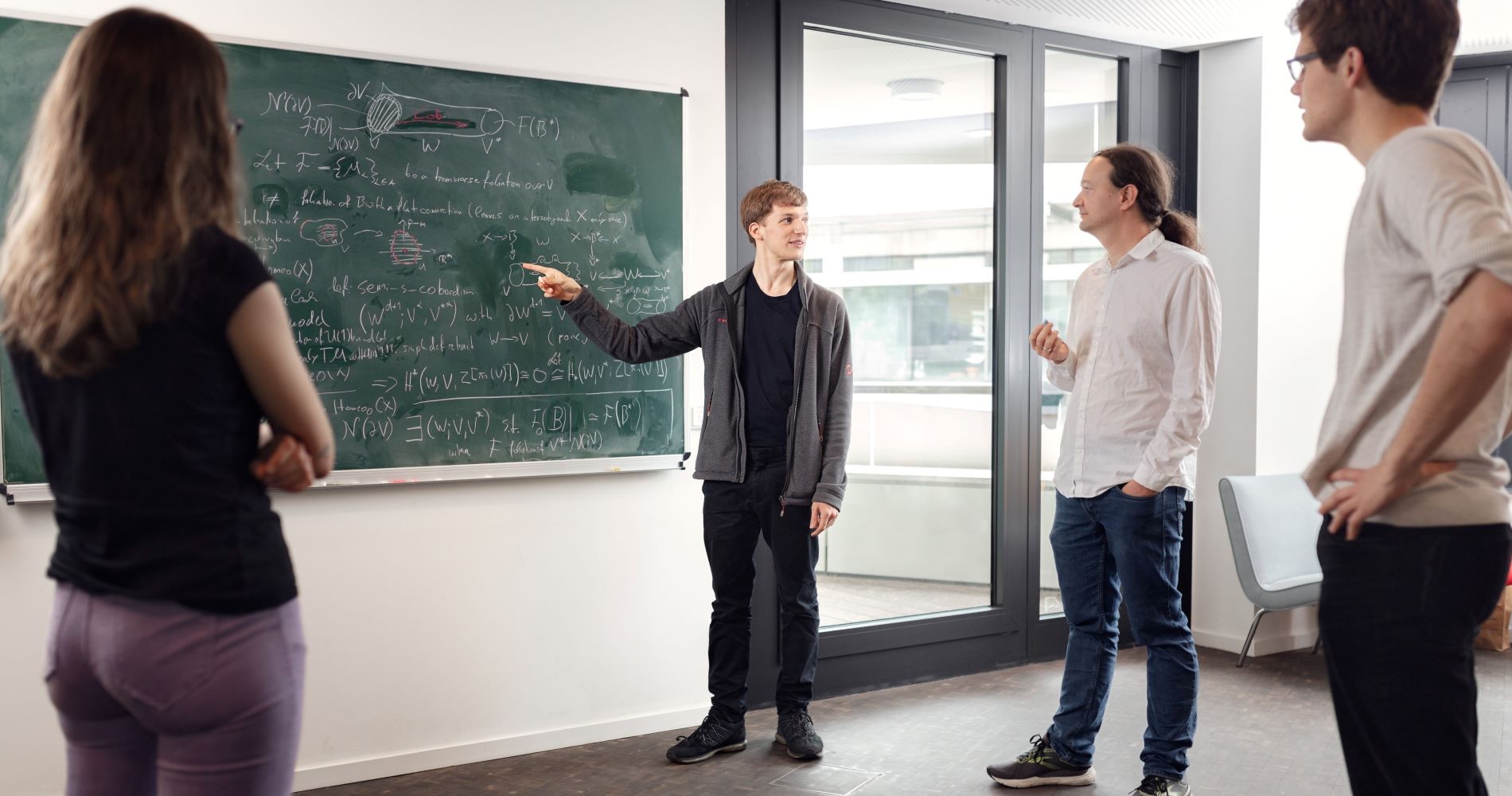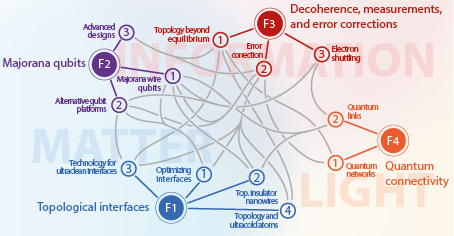Internship program
ML4Q Undergraduate Research Internship Program
The ML4Q Undergraduate Research Internship Program aims to raise the interest of talented students in quantum technologies research. It gives an opportunity of hands-on experience in scientific work and an overview of the research performed in the cluster. The interns will work in one of the ML4Q groups under the direct supervision of a postdoc or senior PhD student and the hosting professor. At the same time they are encouraged to take part in seminars and events at the host institute as well as other cluster sites. The ML4Q Research School provides financial support and assistance in administrative issues. Interested students can apply once a year and join the research group of their choice for a 10 -12-week internship during the summer. Below you can find more information about the program, application procedure, and projects we offer. Call for applications for summer 2024 is closed now. If you have any further questions or something is unclear, do not hesitate to contact the ML4Q Research School coordinator.


Internship projects
Here you can find the projects offered for internships in summer 2024.
Testimonials
Find out how others experienced their internships in our groups!
(c) Image by xvector on Freepik
General overview and useful information
When: 10 -12 weeks between May and September – exact dates will be arranged directly between the interne and the hosting PI.
Who can apply: Excellent international and German BSc students who have completed at least 4 semesters of physics or related studies by the ginning of the internship. Students in their first year of the Master program are also eligible to apply.
How to apply: Interested students can apply to the ML4Q Research School during the call of application (the call for summer 2024 is closed now – application deadline was on November 16th). The decision on admission will be made by mid January. Detailed information can be found in the Application process section.
Support: Accepted students will be offered travel costs reimbursement up to 700 EUR and an internship allowance of 934 EUR per month. The ML4Q Research School will provide help with administrative issues.
Additional useful information
Students from non-German universities will have to enroll as visiting students at the University of Cologne. This will require the submission of additional documents and payment of the semester fee (which allows visiting students to use public transport for free and university facilities such as canteens and sport centers). We will provide detailed information to the accepted students.
If required, we will assist you in arranging accommodation, e.g. in students’ dormitories (if possible). However, students will be responsible for paying their rent. The costs of accommodation vary from city to city, but usually students spend between 400 and 600 EUR on rent per month.
Please note that you have to make sure you have a valid health insurance in Germany. It is also advisable to also have an accident and personal liability insurance.
Application process
Excellent BSc students are encouraged to apply to our ML4Q Undergraduate Research Internship Program. The call for applications for Internship 2024 is open till November 16th.
Requirements
- At least 4 completed semesters of physics or aother relevant program
- Completed course in quantum mechanics (additional courses relevant for individual projects are listed in the project descriptions)
- Excellent academic record reflected in overall GPA
- Proficiency in English corresponding to an IELTS score of at least 6.5 or equivalent (please note you do not need the IELTS certificate to apply)
- Research experience is a plus
How to apply
To apply for the program please fill in the online form below. In addition to providing the information requested in the form, you will have to upload the following documents combined into a SINGLE PDF file:
- Your CV,
- Motivation letter of max. 1 page (2500 characters)
- Transcript of Records
- Contact details (name, academic affiliation, e-mail address) of the academic referee (e.g. professor you took courses with, your program coordinator…) who can provide a letter of reference for you. We will contact this person at the later stage to provide a recommendation letter.
Please make sure that your single PDF file does not exceed 5MB and is named as follows:
yourname_ml4q_internship.pdf (e.g. smith_ml4q_internship.pdf).
If you have any questions, please contact the Research School coordinator.
The applications will be evaluated by the Research School coordinator and the professors offering the project. The evaluation results will be announced to the applicants by mid-January at the latest.
Internship projects 2024
Projects offered for summer 2024
Topological Quantum Error Correction
Host: Markus Müller, RWTH Aachen/Forschungszentrum Jülich
Topological quantum error correcting codes such as the surface code or color codes provide one of the most promising routes towards realising robust and fault-tolerant quantum computers, currently pursued by academic research groups but also leading tech companies. In this theory internship project, you will first familiarise yourself with the basics of quantum error correction, and then implement, and analytically and numerically benchmark the performance of a quantum error correcting code and decoder that is suitable for a realistic experimental implementation of logical qubits.
Project-specific requirements:
Completed course in quantum mechanics and solid understanding of quantum mechanics.
Ideally completed course on quantum computing / quantum information / quantum algorithms.
Some knowledge in numerical programming (e.g. in python, matlab, C++).
Quantum Neural Networks and Machine Learning
Host: Markus Müller, RWTH Aachen/Forschungszentrum Jülich
Quantum neural networks have been proposed as a computational paradigm to combine benefits such as massive parallel information processing in neural networks with advantages like the computational speedup promised by quantum computers. In this theory internship, you will first familiarise yourself with the basics of quantum neural neural networks and machine learning. You will then implement a quantum neural network based on a quantum Hopfield, multi-layer or quantum cellular automaton network architecture, and investigate and benchmark its performance for applications such as information storage and retrieval, or for quantum error correction.
Project-specific requirements:
Completed course in quantum mechanics and solid understanding of quantum mechanics.
Ideally completed course on quantum computing and algorithms, and possibly also in machine learning.
Some knowledge in numerical programming (e.g. in python, matlab, C++).
Scalable Quantum Computing with Rydberg Atoms
Host: Markus Müller, RWTH Aachen/Forschungszentrum Jülich
Qubits encoded in electronic states of neutral atoms held in optical tweezer arrays provide a highly promising, quickly developing platform for scalable quantum computing. Atoms can be laser-excited to Rydberg states with strong and long range-interactions, which can be used to realise fast and high-fidelity two- and multi-qubit gate operations between atoms. In this theory internship, you will first familiarize yourself with the basics of quantum computing and algorithms. You will then develop and numerically implement protocols for quantum gate operations between Rydberg atoms and investigate their expected performance under realistic conditions and noise sources, as building blocks of more complex quantum algorithms.
Project-specific requirements:
Completed course in quantum mechanics and solid understanding of quantum mechanics.
Ideally completed course on atomic physics or quantum optics.
Some knowledge in numerical programming (e.g. in python, matlab, C++).
Spin Qubits in Graphene Quantum Dots
Host: Christoph Stampfer, RWTH Aachen
We assess the potential of bilayer graphene quantum dots as hosts for valley and spin qubits. With our state-of-the-art fabrication technology, we can form quantum dots in bilayer graphene which allow control of the charge carrier occupation and the interdot tunnel coupling. In this type of devices, we studied e.g. spin relaxation times [1] and achieved a spin-valley blockade in an electron/hole double quantum dot [2].
The goal of this project is the characterization of spin and valley relaxation rates. For that purpose, we use devices with capacitively coupled single electron transistors acting as charge sensors. This will allow time-resolved detection of individual spin and valley states. A high-frequency reflectometry measurement technique will be used to enhance the readout fidelity.
Depending on your personal interests, your focus can lie on the device fabrication or on measurements and data analysis. You will gain expertise in high-frequency quantum transport experiments, in the physics of 2D materials and in the relevant fabrication techniques.
[1] Banszerus, Hecker et al., Nature Communications 13, 3637 (2022).
[2] Banszerus, Möller et al., Nature 618, 51 (2023).
Project-specific requirements:
This project requires a background in the field of solid state physics or 2D materials. First experience in quantum transport measurements or programming (python) is beneficial but not required.
Building a portable magneto-optical trap for Strontium atoms
Host: Sebastian Hofferberth, Bonn University
Help us design & construct the world-first portable Strontium MOT – which will make ultracold atoms visible by eye in a compact setup to be used in outreach, teaching & student research. In this project you can gain hands-on experience in design & setup of state-of-the-art AMO experiments.
Josephson radiation measurements
Hosts: Christian Dickel & Daniel Rosenbach (Ando & Bocquillon Groups), University of Cologne
Embedded within the II. Institute of Physics in the University of Cologne we are investigating electromagnetic signals emitted by Josephson junctions. These are nano- to micrometer scaled devices that consist of two superconducting metals interrupted by an insulating or semiconducting material.
In order to measure Josephson radiation from these devices we need cryogenic temperatures, a radio-frequency pick-up, an amplification chain for the measured signal and working devices. Based on your interest and personal background we could discuss how you can contribute to our efforts.
Projects might cover the fabrication of devices in a cleanroom environment, operation and optimization of measurements at cryogenic temperatures, implementation of measurement and analysis routines using python or conceptualizing and testing new components for the measurements setup.
Project-specific requirements:
Completed course on electromagnetism.
At least one practical course in experimental physics.
Experience in numerical programming, especially with Python, would be preferable
Investigating electronic transport in topologically protected edge states
Hosts: Boris Stanchev, Erwann Bocquillon Group, University of Cologne
Thanks to their unique quantum mechanical properties, thin-film quantum anomalous Hall insulators are a building block for an emerging class of microelectronic devices. Electrons in these materials flow along one-dimensional edge channels, giving us a unique way of engineering quantum systems in these devices. In the Bocquillon group, we study the fundamental electronic transport properties of devices based on these films. For this project, focus lies in the control of the flow of electric currents along the edge channels. The direction of this current depends on the direction of the magnetization of these thin films. We will study how to reverse the magnetization by applying large current pulses, which will then let us create co-propagating edge channels at the interface between two magnetic domains.
A potential intern may choose to focus on cleanroom microfabrication, characterization of devices at the mK temperature scale, as well as engineering/modifying electronic measurement setups.
Project-specific requirements:
Completed course on quantum mechanics and on electromagnetism
At least one practical course in experimental physics
Lie algebra approaches to quantum dynamics
Host: Dr. David Edward Bruschi, Forschungszentrum Jülich
Controlling the dynamics of quantum systems is key to understanding physical processes and phenomena. Quantum dynamics are defined abstractly via the celebrated Schrödinger equation provided in the theory of quantum mechanics. Application of this tool to simple problems provides clear and immediate evidence of the stark difference between the classical and the quantum world. Nevertheless, obtaining explicit expressions once a Hamiltonian that governs the evolution and an initial state of the system are given is usually an extremely hard task. Among the tools available to tackle this problem one finds Lie theory of groups and algebras, which has been recently employed with some success.
In this project we explore the formal aspects of Lie algebraic approaches to time evolution, focusing on mathematical methods and analytical tools. The goal is to investigate the scope of validity of these approaches, with particular attention to finding explicit solutions and expressions for the dynamics. The starting point is the collection of results obtained to date by the project supervisor. While it might be difficult to obtain concrete closed formulas, pushing the boundaries of our understanding in this area providing no-go theorems, or partial and approximate solutions can still be seen as a successful endeavour.
Project-specific requirements:
Strong mathematical physics background, and an aptitude for analytical and independent work.
Charge noise spectroscopy of interdiffused ohmic contacts in the vicinity of quantum dots
Host: Vincent Mourik, Forschungszentrum Jülich
Hole spin qubits in electrically defined quantum dots inGermanium quantum wells are a great platform for future quantum technologies. One of reasons for its fast success are the lowered fabrication requirements, especially useful is the ability to form electrical contacts to holes using interdiffused metal contacts. In Germanium, distances between the actual spin qubits and the interdiffused contacts is often as low as a few hundreds of nanometers. Since interface defects can be a dominant noise source in spin qubits, investigating the noise spectral density on differently far retracted Ohmic contacts will be investigated in this project.
Project-specific requirements:
A good understanding of quantum mechanics. Background in quantum mechanics necessary.
A basic understanding of DC transport measurements and solid state physics.
Willingness to work with python and homebrewed python libraries.
Novel Josephson junction characterization in Germanium
Host: Vincent Mourik, Forschungszentrum Jülich
Two dimensional hole gases like in strained Germanium have shown recent promise in gated electronics, both with the superconducting and spin community. With the low effective mass, high carrier mobility, spin-orbit coupling, and fermi-level pinning, we open a new toolbox of experiments to be done with proximitized planar Josephson junctions with Germanium. Depending on the properties of the hole gas, we can study exotic versions of existing junction phenomena and try to understand the physics behind few-mode superconducting transport. Through this project, we aim to optimize junction characterization at milli-Kelvin temperatures and gain insight on the effects of junction geometry on the physics of Andreev Bound States in nanoscale devices.
Project-specific requirements:
A good understanding of quantum mechanics. Background in quantum mechanics and electronics necessary.
A basic understanding of DC transport measurements and Josephson junctions.
Willingness to work with python and homebrewed python libraries.
